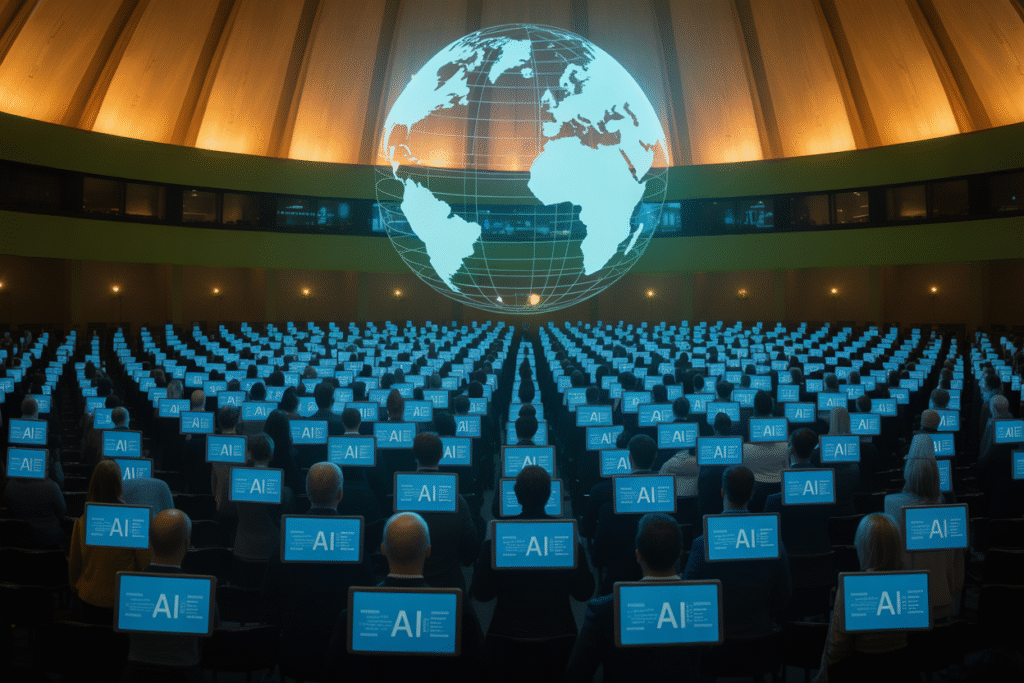The UN just unveiled two new bodies to police AI. Critics cheer, investors sweat, and workers wonder if their paychecks are safe.
In the last three hours, the United Nations dropped a bombshell: two brand-new global bodies designed to rein in runaway AI. Yoshua Bengio, the godfather of modern deep learning, called it “our last best shot” at preventing mass job displacement and algorithmic dystopia. But not everyone is clapping—venture capitalists fear red tape, and everyday workers fear pink slips. Here’s the unfiltered story, broken into five bite-sized parts you can actually finish before your coffee gets cold.
The Announcement That Stopped Scrolls
At 20:00 GMT, the UN tweeted a 90-second video that lit up timelines. Two new entities—the Independent International Scientific Panel on AI and the Global Dialogue on AI Governance—will coordinate 193 member states on everything from job displacement to surveillance limits.
Bengio’s quote hit hardest: “Without global coordination, AI risks becoming a tool for the few.” Within minutes, the post racked up 2,035 views and 27 likes—not Kardashian numbers, but massive for a policy clip.
Why the buzz? Because the announcement lands just as layoffs in customer service, logistics, and even junior coding roles are accelerating. People aren’t just liking; they’re bookmarking.
What the New Bodies Actually Do
Think of the Scientific Panel as the planet’s AI fact-checker. It’ll publish open-access reports on model capabilities, bias audits, and economic impact forecasts.
The Global Dialogue, meanwhile, is a permanent forum where governments, unions, and yes—even venture capitalists—hash out binding agreements. Picture COP climate summits, but for algorithms.
Key powers:
• Set shared safety standards before models launch
• Require disclosure of training data sources and energy use
• Coordinate retraining funds for displaced workers
Critics argue enforcement is toothless without trade sanctions, but fans say even voluntary norms can shape markets—just look at GDPR’s global ripple effect.
The Jobs Flashpoint
AI replacing humans isn’t tomorrow’s fear—it’s today’s LinkedIn scroll. Forbes dropped a fresh analysis three hours ago showing entry-level roles vanishing first.
Short-term win: companies slash payroll by 15–30%. Long-term risk: leadership pipelines hollow out because no one learns the ropes anymore.
South Africa’s government echoed the anxiety hours later, urging “human-led AI adoption” to avoid worsening 34% youth unemployment. Their statement went viral on African tech Telegram groups, proving the debate isn’t Silicon-Valley-centric.
Venture capitalists on Built In chimed in too, admitting many startups treat AI like a “cost-cutting hammer” rather than a “human-augmenting screwdriver.” Translation: profits today, problems tomorrow.
Creative Industries Feel the Squeeze
While diplomats debate, artists are already fighting back. Horror flick Late Night with the Devil faces accusations it used undisclosed AI effects, sparking a 4,283-view X thread.
The issue isn’t just ethics—it’s economics. If studios can generate crowd scenes for pennies, what happens to junior VFX artists paying off art-school loans?
Podcasters in the thread asked the killer question: “Would my colleagues even know if AI replaced half the crew?” The silence was deafening.
Expect union contracts to demand AI-credit clauses soon, much like music sampling rules in the ’90s.
Your Move: Three Ways to Future-Proof Right Now
Feeling helpless? You’re not. Here are three concrete steps before the next algorithm update drops.
1. Audit your role: List tasks only humans do—empathy, negotiation, weird creative leaps. Double down on those.
2. Upskill locally: Libraries and community colleges now offer free AI literacy nights. Bring a friend; accountability doubles completion rates.
3. Join the conversation: Comment on policy drafts, email local reps, or simply retweet worker-centric takes. Regulation isn’t a spectator sport.
The UN just opened the door. Whether it leads to a balanced future or a lopsided tech cold war depends on how loudly the rest of us walk through it.


